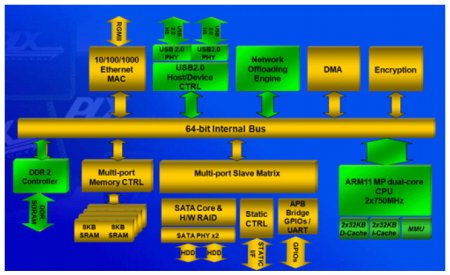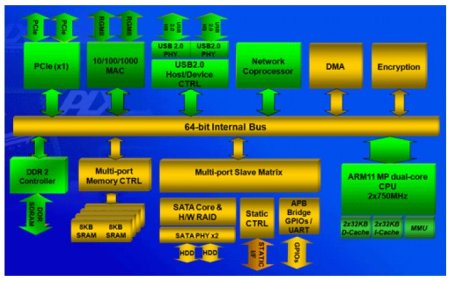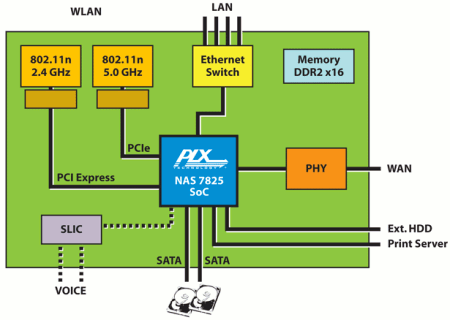Linux-ready SoCs target consumer NAS devices
Jan 15, 2010 — by Eric Brown — from the LinuxDevices Archive — 89 viewsPLX Technology announced a Linux-ready NAS 7800 system-on-a-chip (SoC) family for home network attached storage (NAS) devices. The low-end NAS 7820 and NAS 7821 and the high-end NAS 7825 offer dual ARM11 processors clocked to 750MHz, network security engines and a variety of hardware acceleration engines, says the company.
The NAS 7800 SoCs are based on technology acquired when PLX Technology purchased Oxford Semiconductor last January. PLX says the NAS 7800 family represents Oxford's third generation of consumer NAS SoC solutions. The company's chief line of business lies in PCI and PCIe bridges, switches, and processors.
Features supported by the PLX NAS 7800 family include basic NAS storage-sharing duties, plus high-speed streaming of high-definition video and high-resolution audio and photos, says the company. A Linux-based SDK (see farther below) is said to support connections to multiple computers, smartphones, digital photo frames (DPFs), Internet radio sites, and more.
According to PLX, the SDK also provides pre-developed applications that integrate NAS into set-top boxes (STBs) when using the NAS 7825. (As we'll explain below, this high-end part offers additional I/O designed for integrating NAS functionality in STBs, DVRs, and routers/gateways.)

NAS 7820/7821 architecture
(Click to enlarge)

Trident architecture
(Click to enlarge)
- Gigabit Ethernet MAC with an TCP/IP offload engine (TOE) that transfers at Ethernet line rates
- Eight-channel, low-latency buffered memory controller supporting DDR2 memory bandwidth bursts at 12Gbps
- Eight DMA engines in multiple bus masters to transfer data without processor intervention
- Internal SRAM memory for storing frequently used data
- High-performance SATA controller with internal data buffers
- Scatter/gather DMA controller, in-line encryption, and RAID functions
All three of the NAS 7800 SoCs clock their ARM cores to 750MHz, and they all share the same network co-processor, hardware acceleration engines, and a common 17 x 17mm 256 FBGA format. The SoCs also provide a 64b AXI multi-issue CPU bus architecture that enables numerous simultaneous transfers and data throughput bursts of up to 70Gbps, claims PLX.
All three SoCs support up to 512MB RAM, as well as SPI serial NOR flash, and SLC/MLC NAND flash, says PLX. The SoCs are said to offer dual USB 2.0 interfaces, as well as UART, SPI, I2C, and JTAG I/O. They also provide RGMII (reduced gigabit media independent interfaces) Ethernet connections, said to be required in secure router applications, as well as PCI Express interfaces.
The NAS 7820 and NAS 7821 are aimed at low-cost consumer NAS devices, and appear to be identical except that the 7821 offers two SATA interfaces instead of the 7820's one. Also, like the 7825 model, the 7821 SoC offers RAID support (RAID 0/1).
The high-end NAS 7825 is aimed at NAS-enabled routers/gateways, DVRs, and STBs, says the company (see architecture diagram below). The SoC offers dual PCIe 1.0 and dual RGMII connections instead of the single interfaces supplied by the 7820 and 7821, says PLX.

NAS 7825 architecture
(Click to enlarge)
The SDK also ships with a third party application environment for UPnP/DLNA media serving, content management, backup, remote management, and other NAS functions, says the company. Rapid Development Kits (RDKs), which include development boards and reference design schematics, are also said to be available.

Consumer NAS router/gateway reference design for NAS 7825
(Click to enlarge)
Availability
General sampling and RDKs will be available for the NAS 7800 SoCs in the first quarter, followed by full production in Q2 2010, says PLX Technology. Volume unit pricing is said to be $15 for the NAS 7825, $13 for the NAS 7821 and $11 for the NAS 7820.
More information on the NAS 7820 and NAS 7821 may be found here and here, respectively. More on the NAS 7825 should be here.
This article was originally published on LinuxDevices.com and has been donated to the open source community by QuinStreet Inc. Please visit LinuxToday.com for up-to-date news and articles about Linux and open source.